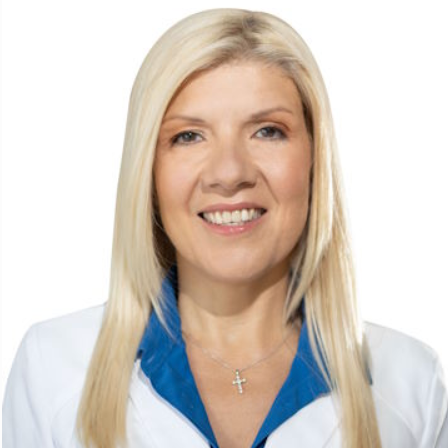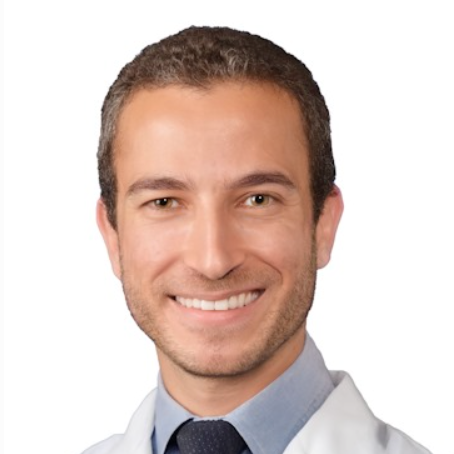Why It’s Time to Retire the Term “Geriatric Pregnancy”
A new HRC Fertility survey reveals that outdated language like “geriatric pregnancy” causes real emotional harm — and doctors say it’s time to leave it behind.
By
Lana Pine
| Published on October 16, 2025
9 min read
Kay Waud, M.D., Ph.D., FACOG
Credit: HRC Fertility

The phrase “geriatric pregnancy” has long been used in medicine to describe pregnancies in women aged 35 and older — but new research shows it’s time for this outdated label to go. In a national survey commissioned by HRC Fertility, 65% of Americans said the term causes unnecessary anxiety, and 68% said it undermines self-esteem.
In an interview with The Educated Patient, Kay Waud, M.D., Ph.D., FACOG, and Roy Handelsman, M.D., FACOG, of HRC Fertility, discuss why language in reproductive medicine matters, how stigmatizing terms can shape a patient’s emotional experience, and what more accurate, supportive alternatives — like “advanced maternal age” — better reflect today’s understanding of fertility and pregnancy care.
Roy Handelsman, M.D., FACOG
Credit: HRC Fertility

What does the term “geriatric pregnancy” mean, and why is it considered outdated or even harmful today?
Kay Waud, M.D., Ph.D., FACOG: “Geriatric pregnancy” is a nontechnical historical term referring to pregnancy in women aged 35 years or older at the estimated date of delivery.
Today, the term is considered outdated and potentially harmful for several reasons. HRC Fertility commissioned a third-party survey of 1,000 U.S. adults over the age of 18 to uncover fresh insights into patient experiences around the term “geriatric pregnancy.” The survey results suggest that using such stigmatizing language to describe a patient population can cause anxiety about patients’ reproductive choices. It also has an emotional impact because hearing such a label can lead patients to internalize unnecessary fear, shame or guilt, which can affect their experience of pregnancy and care. According to HRC Fertility’s survey, 65% of Americans say the term “geriatric pregnancy” causes unnecessary anxiety.
Roy Handelsman, M.D., FACOG: While it may have once been standard medical language, it now feels out of step with how we understand and support patients today. The word “geriatric” carries connotations of old age and decline that no one would really associate with someone in their reproductive years. This misrepresentation frequently elicits unnecessary feelings of additional stress, concern or anxiety.
How can language used in fertility and pregnancy care affect how patients feel about their health and their options?
KW: Language plays a powerful role in shaping how patients experience fertility and pregnancy care. The words clinicians use can either foster trust and empowerment or create shame and fear. According to the results of HRC Fertility’s survey, 35% of women ages 35 to 44 said they would definitely consider switching doctors if labeled with “geriatric pregnancy.” Maybe decades ago, fewer 35-year-old women had options regarding their reproductive goals, but currently we offer many advanced treatments that allow majority of our patients in this age group have healthy babies.
RH: Language matters deeply in fertility care, especially because patients are often navigating emotionally complex and stressful experiences. The words we use can either empower or alienate. It’s our job in the medical profession, and especially as fertility specialists, to support our patients, and that includes using language that is respectful and inclusive.
What are more accurate or supportive terms that providers and patients can use instead?
KW: A more accurate, compassionate, and patient-centered term that providers and patients can use instead of outdated or stigmatizing language in fertility and pregnancy care is “advanced maternal age.” This term focuses on factual, age-related considerations without judgmental tone. HRC Fertility is advocating for the use of more neutral clinical terms such as “advanced maternal age.”
RH: While these terms are more neutral, I believe even they can carry emotional weight. While it’s true that increasing age can lead to increased risks during pregnancy or can make it harder to get pregnant, nothing magically happens on your 35th birthday. Instead of categorizing people into labels, we should focus on individualized care and counsel our patients about their unique risks that factor in their age and medical conditions.
With new laws like California’s fertility insurance mandate (SB 729) expanding access to care, why is it important that the language around fertility evolves too?
KW: As fertility care becomes more accessible under laws like California’s SB 729, it’s essential that the language surrounding it evolves as well. Expanding coverage is only part of the progress. The words used in clinics, policies and patient conversations must reflect inclusivity, respect and modern understanding.
RH: California’s fertility insurance mandate is a major step forward in making care more accessible. As more people gain access, including those who’ve delayed family building due to financial barriers, it’s essential that our language evolves alongside our policies. Inclusive, respectful language helps ensure that all patients feel welcome, understood and supported throughout their fertility journey.
What should patients know if they are thinking about pregnancy later in life — are there real risks to be aware of, and how can they be managed?
KW: Patients planning family building in their mid- to late 30s should be informed about the natural decline in fertility with advanced maternal age. Historical evidence, dating back to the 16th century, suggests that communities with similar fecundity rates were observed in each maternal age bracket as we experience it today. The difference lies in the availability of advanced reproductive technologies, such as in vitro fertilization, egg freezing and preimplantation genetic testing for aneuploidies, which enable many of our patients to conceive. While many individuals over 35 have healthy pregnancies, there are slightly higher risks compared with younger patients. Pregnancy later in life carries some increased risks, but most can be effectively managed with proactive medical care, early planning and close monitoring. Many patients over 35 go on to have healthy pregnancies and babies.
RH: With increasing age, pregnancy risks do increase. The major ones we talk about are high blood pressure, gestational diabetes, preterm birth and increased miscarriage. But age is just one factor, and it doesn’t tell the whole story. What matters most is understanding each person’s individual health profile. With proper monitoring and care from an OB-GYN, many of these risks can be managed effectively. Increasing age can also make it more difficult to get pregnant. Fertility specialists can evaluate for and treat age-related fertility decline with the caveat that further increasing age may require more extensive treatment.
How can patients speak up if they feel uncomfortable with outdated or stigmatizing language during fertility treatment?
KW: Patients absolutely have the right to advocate for themselves if they feel uncomfortable with language during fertility care. According to the HRC Fertility survey on this topic, two in three women want “geriatric pregnancy” eliminated from medical vocabulary. In addition, the same survey suggests men want the term “geriatric pregnancy” eliminated, too. In such situations, my recommendation is that our patients directly address the issue with their physicians and care teams. They can explain the impact and request alternative options. Fertility care should be a positive experience for all patients. Anxiety-provoking and stressful language should be eliminated from our communications with patients.
RH: It’s not always easy to speak up, especially in medical settings. Our survey found that 35% of women aged 35 to 44 would definitely consider switching doctors if they heard the term “geriatric pregnancy” used. If a patient feels comfortable addressing it directly, either in the moment or later, I encourage them to do so. If not, finding a care team that aligns with their values, including the use of inclusive language, can make a big difference in their experience.
Kay Waud, M.D., Ph.D., FACOG, is a double board-certified physician specializing in obstetrics and gynecology and reproductive endocrinology and infertility. She sees patients at HRC Fertility San Francisco.
Roy Handelsman, M.D., FACOG, is a board-certified OB-GYN and fellowship-trained reproductive endocrinology and infertility specialist who combines technical expertise with a deeply human approach to patient care. He sees patients at HRC Fertility’s Encino and West Lake Village locations.

